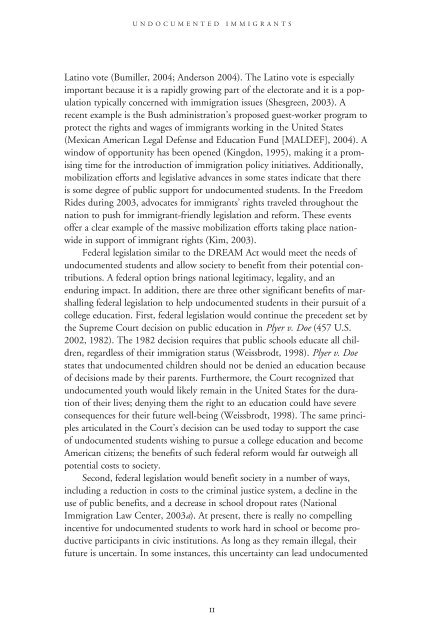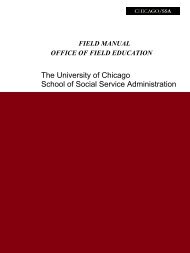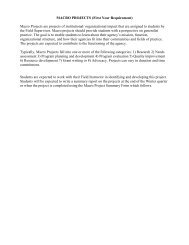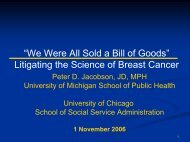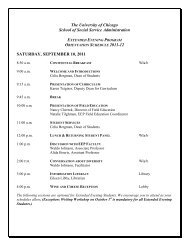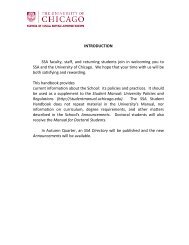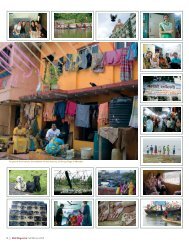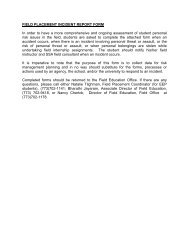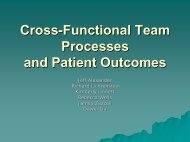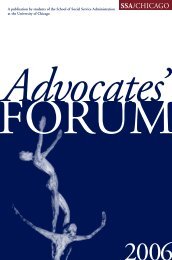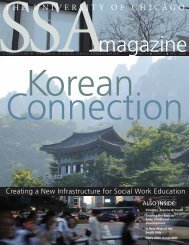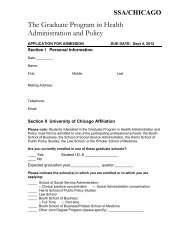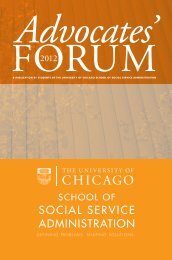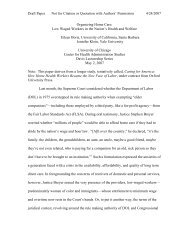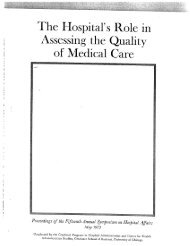2004 - School of Social Service Administration - University of Chicago
2004 - School of Social Service Administration - University of Chicago
2004 - School of Social Service Administration - University of Chicago
Create successful ePaper yourself
Turn your PDF publications into a flip-book with our unique Google optimized e-Paper software.
UNDOCUMENTED IMMIGRANTS<br />
Latino vote (Bumiller, <strong>2004</strong>; Anderson <strong>2004</strong>). The Latino vote is especially<br />
important because it is a rapidly growing part <strong>of</strong> the electorate and it is a population<br />
typically concerned with immigration issues (Shesgreen, 2003). A<br />
recent example is the Bush administration’s proposed guest-worker program to<br />
protect the rights and wages <strong>of</strong> immigrants working in the United States<br />
(Mexican American Legal Defense and Education Fund [MALDEF], <strong>2004</strong>). A<br />
window <strong>of</strong> opportunity has been opened (Kingdon, 1995), making it a promising<br />
time for the introduction <strong>of</strong> immigration policy initiatives. Additionally,<br />
mobilization efforts and legislative advances in some states indicate that there<br />
is some degree <strong>of</strong> public support for undocumented students. In the Freedom<br />
Rides during 2003, advocates for immigrants’ rights traveled throughout the<br />
nation to push for immigrant-friendly legislation and reform. These events<br />
<strong>of</strong>fer a clear example <strong>of</strong> the massive mobilization efforts taking place nationwide<br />
in support <strong>of</strong> immigrant rights (Kim, 2003).<br />
Federal legislation similar to the DREAM Act would meet the needs <strong>of</strong><br />
undocumented students and allow society to benefit from their potential contributions.<br />
A federal option brings national legitimacy, legality, and an<br />
enduring impact. In addition, there are three other significant benefits <strong>of</strong> marshalling<br />
federal legislation to help undocumented students in their pursuit <strong>of</strong> a<br />
college education. First, federal legislation would continue the precedent set by<br />
the Supreme Court decision on public education in Plyer v. Doe (457 U.S.<br />
2002, 1982). The 1982 decision requires that public schools educate all children,<br />
regardless <strong>of</strong> their immigration status (Weissbrodt, 1998). Plyer v. Doe<br />
states that undocumented children should not be denied an education because<br />
<strong>of</strong> decisions made by their parents. Furthermore, the Court recognized that<br />
undocumented youth would likely remain in the United States for the duration<br />
<strong>of</strong> their lives; denying them the right to an education could have severe<br />
consequences for their future well-being (Weissbrodt, 1998). The same principles<br />
articulated in the Court’s decision can be used today to support the case<br />
<strong>of</strong> undocumented students wishing to pursue a college education and become<br />
American citizens; the benefits <strong>of</strong> such federal reform would far outweigh all<br />
potential costs to society.<br />
Second, federal legislation would benefit society in a number <strong>of</strong> ways,<br />
including a reduction in costs to the criminal justice system, a decline in the<br />
use <strong>of</strong> public benefits, and a decrease in school dropout rates (National<br />
Immigration Law Center, 2003a). At present, there is really no compelling<br />
incentive for undocumented students to work hard in school or become productive<br />
participants in civic institutions. As long as they remain illegal, their<br />
future is uncertain. In some instances, this uncertainty can lead undocumented<br />
11


